 |
|||||||||
 |
|||||||||
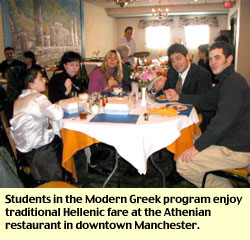 |
March 19, Manchester,N.H -- The student reads aloud in Greek. It's a passage from To Trito Stefani, the celebrated novel by Kostas Tachtsis concerning two Athenian women and their observations of life during and after the Nazi occupation. "Very good," the teacher says. "Now can you translate it for me?" The place is Murkland Hall on the campus of the University of New Hampshire. What began as a one-year course in Modern Greek has blossomed into an innovative program designed to meet a growing interest in the language. "It's starting to take off in this country," the program's director, Professor Nina Gatzoulis, says. "And there's no other state university in the New England area that's doing this right now." Modern Greek has long been a popular way for UNH students to meet their language requirement. Initially, two semesters were offered. But now the university has added two more years, and will soon add a fourth year to round out the program. "We are the only school in the region that offers three years of Greek, and four years next year," Gatzoulis explains. With four years of Greek available, UNH students will be able to major in the language. Currently they can do so through the university's interdisciplinary program, which allows students to self-design their major by taking relevant courses in different departments. For example, a student might decide on a Mediterranean Studies major that would include Italian as well as Greek, plus courses in art history and philosophy. Training in the language is an important, but not the only, part of Modern Greek studies. Field trips to museums, churches, and other places of interest keep students in touch with the Hellenic legacy and New England's vibrant Greek-American community. Recently, we caught up with Gatzoulis' students in Manchester, where they were on a class trip that took them first to St. George's Greek Orthodox Cathedral, and then to downtown's Athenian restaurant for traditional Hellenic cuisine. Jennifer Liakopoulos, a senior studying communication disorders at UNH, takes Greek in part so she could communicate better with her grandparents. "Both my parents were born in Greece," she says, "my dad about 20 years ago, and my mother as a teenager." The Massachusetts native calls herself "pretty fluent" in Greek. "I'm really happy to see that they're expanding on the Hellenic program and that they're starting to implement study abroad," Liakopoulous says. "It's good for the kids who have a Greek background, and also for other kids who want to learn about Greek culture and its traditions. It's a wonderful program." Greek-Americans like Jennifer make up about half of the students enrolled in modern Greek at UNH, according to Professor Gatzoulis. And the others? They take Greek for a variety of reasons. As the most developed country in the Balkans, Greece plays an increasingly visible role in a region that is rarely out of the news. Greece also belongs to the European community, and, Gatzoulis is quick to point out, "every major European university has a Greek studies program." Another good reason to study Greek, Gatzoulis says, is because in a sense every American already speaks it. As much as forty percent of English vocabulary is derived from Greek. The program's immediate goal is to increase the number of students. The current number, 25, is respectable for a new program, but Gatzoulis would like to see many more enroll. "What we would like to do," she explains, "is create some kind of an organization supported by the Greek community" in New Hampshire. "We'd like to work towards a major in Hellenic studies, and also offer scholarships. Students can receive these scholarships, and use them to study in Greece." For more information about the modern Greek program at UNH, e-mail Professor Gatzoulis at ninagatz@mediaone.net |
||||||||
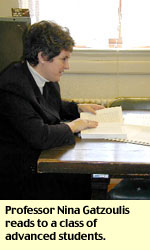 |
|||||||||
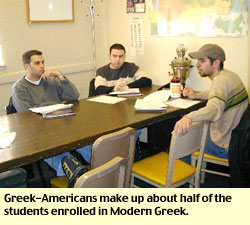 |
|||||||||
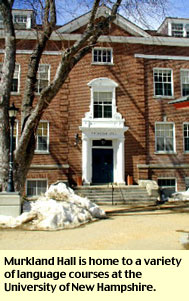 |
|||||||||
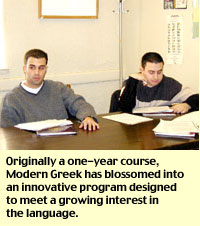 |
|||||||||
|
|||||||||
